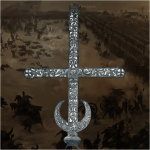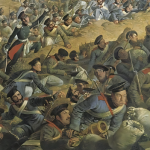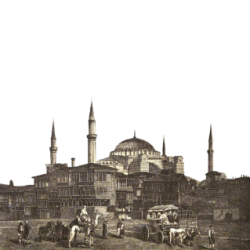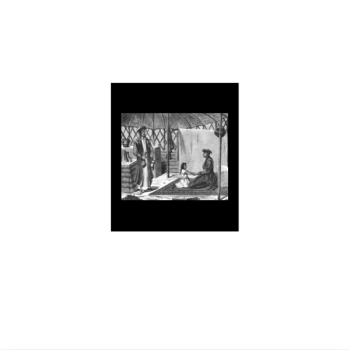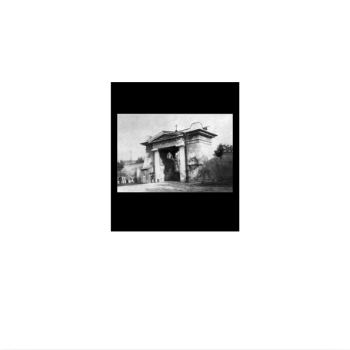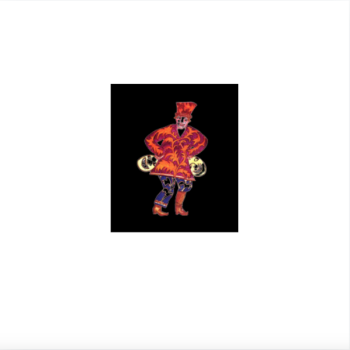PENZA
Spring 1826
During Andrei Mikhailovich’s management of the Ekaterinoslav Settlement Office, his relations with the Governors were frequent and, in general, quite good. There was Governor Shemiot (who left this position in 1823.) Trofim Matveevich Tsalaban replaced him, but he did not last a year. Alexei Ivanovich Svyechin, who held the office from 1824 to 1828 was kind but “empty-headed.” He was followed by Dmitriy Zakhorzhevskiy, an honest, intelligent, well-intentioned man, but embarrassed by formalism, and left the place in 1831. After him was Baron Otto Romanovich Frank, former adjutant of Count Vorontsov, a great friend of Andrei Mikhailovich, but not at all fit to be Governor. (He was soon transferred to Taganrog.) His successor, Nikanor Longinov, a former secretary of Count Vorontsov, was renowned for his arrogance. Needless to say, the steady stream of Governors made for difficult work for Andrei Mikhailovich.
In the spring of 1826 Andrei Mikhailovich traveled to Kishinev for a business meeting with Inzov, and in July took a month off and went with Elena Pavlovna and the children to Penza for a reunion with her father, Prince Pavel Vasilyevich, her aunt, Ekaterina Vasilyevna, and her sister, Anastasia Pavlovna Sushkova, who lived together on the family estate, “Marfovka.” (Elena Pavlovna’s grandmother, Princess Anastasia Ivanovna and her uncle, Prince Sergei Vasilyevich, had died three years earlier.)
Anastasia Pavlovna was a very kind and beautiful woman, but extremely unhappy in her marriage, lived separated from her husband and children, but soon died in her prime. Her husband, Alexander Vasilyevich Sushkov was a terrible gambler, with a generally reckless nature. When he was lucky at cards. He made himself a bath of champagne and threw handfuls of money out the window and into the streets. When he was unlucky in cards (as was more often the case) he gambled everything away—even his wife’s last handkerchief. He was often brought home covered in blood after some scandal or duel. It was clear that the life of a young woman under such conditions was at times unbearable and contributed to the development of an aneurysm that would eventually kill her. Alexander Vasilyevich would die soon after, in prison, where he was sent rioting in church. The eldest of their two daughters, a very romantic young lady with a poetic conviction and fiery black eyes named Katerina Aleksandrovna, lived with her Marya Vasilievna Bekleshova (and other relatives) alternately in Moscow, St. Petersburg, and Pskov. The younger Sushkova sister, the hunchbacked Lizaveta Aleksandrovna, was brought up in the Smolny Monastery in Petersburg. (She would later marry Lodyzhensky.)[1]
Their arrival in Penza almost caused a quarrel between Pavel Vasilyevich and his sister, Ekaterina Vasilyevna. The prince wanted them to stay with him, while his sister demanded they stay with her. (The argument was settled diplomatically, with the Fadeevs staying alternatively between both houses.) Ekaterina Vasilyevna loved Elena Pavlovna more than her younger niece and frequently told her that she would leave her entire fortune (movable and immovable) to her. (She never did, however, as she never could find the spirit to make a will.) Her house was decorated quite richly; the chests in the pantries were filled with silver sets with their accessories, and the tables in the rooms were decorated with large silver vases and candelabra. She often told Helena and Katya Andreevna that, feeling already “outdated,” she no longer wished to dress up anymore, and her intention of handing over all her precious things one day. At the same time, she seated them near her and ordered them to bring boxes filled with bracelets, earrings, clasps, rings, and other expensive ornaments sets with diamonds and semi-precious stones. She showed all these things to the girls, and talked much on the dignity of jewelry, laying the pieces out in front of her as she examined them as if they were the calcified memories of younger years. She ended by showing the girls some kind of ring with small coral.
“You know, children, you are still little,” she affectionately declared. You do not yet understand what these are worth. You’ll lose it or break it. I won’t give it to you now, but I’ll keep it safe for you. When you grow up and are wiser, then I shall give it to you.”
She then put the jewelry back into their cases and drawers, carefully locked them, and took them back to her place. This procedure was repeated almost daily. There was a kind of battle waging within her—she sincerely wished to give these items away, but she did not seem to have the strength to part with them. After her death in 1831, all of her wealth disappeared without a trace—plundered it would seem. Prince Pavel Vasilyevich, who would have been the direct heir should his sister have left a will, was an old man. He did not take timely measures, and everything (with the exception being the immovable estates) went to dust. After her death, Andrei Mikhailovich and Elena Pavlovna did not hurry to examine the estate, as they did not want any haste of their arrival to be attributed to the desire of taking advantage of the inheritance. By the time they arrived, of all the treasures of Ekaterina Vasilyevna, so vigilantly guarded by her, only a few chests filled with old acting costumes from the former home theater of Kozhin survived.
During their stay in Penza, Andrei Mikhailovich had the opportunity to go into private service as a farmer with a huge salary. This change of career was somewhat appealing, but he thought it best to consult his father-in-law first. He soon regretted this solicitation, as the old Rurik blood which coursed through the veins of Prince Pavel Vasilyevich simmered with indignation.
“If you become a farmer, I will have no choice but to shoot myself in the forehead,” said Prince Pavel Vasilyevich, perhaps unreasonably. “I will not endure such humiliation! To think, my son-in-law, my daughter’s husband, laboring in private service!”
This was the prevailing sentiment of the time regarding private service in general and farming in particular. This would change in the coming decades, and some people from the best, high-ranking families, would become involved in farming enterprises, which did not diminish their social position. Money, not names, would soon become the engine of the world, and family pride did not stand a chance against the irresistible allure of money. Though it had always been a great power in some sense, it was still a rarity for one to exchange pride and genealogical customs for capital. Nevertheless, Prince Pavel Vasilyevich was not at all opposed to wealth, he was simply indignant at the thought of becoming a laborer for a large sum of money. At the same time, Prince Pavel Vasilyevich was fussing intensely over a large inheritance that may or may not have even existed.
There was a family legend that the Dolgoruky family stubbornly maintained. They claimed that Prince Sergei Grigorievich did not trust Tsarina Anastasia Ivanovna or Ernst Johann von Biron (despite the favors shown to him in St. Petersburg after his exile.) He interpreted their seemingly good disposition towards himself as a death sentence. Before he was executed, a few days before his appointed departure for England, Prince Sergei Grigorievich transferred one hundred thousand rubles (converted to English currency) to The Bank Of England. He left instructions for it to remain there for one hundred years accruing interest, after which it would be issued to his direct descendants. One hundred years was now drawing to a close, and the only direct descendant remaining was Prince Pavel Vasilyevich, and he was actively engaged in information and explanations on this matter. Andrei Mikhailovich wrote to the Russian embassy and consulate in London and found people there who undertook to find out what was possible. A large correspondence began in search of documents relating to the fortune, that, with accumulated interest, amounted to the tidy sum of twenty million. Unfortunately, all searches thus far remained unsuccessful. The Bank Of England typically published a list of all the deposits it had in its vaults every twenty years, along with the names of the depositors. The prince was rightly perplexed as to why the bank had failed to list the Dolgoruky name in previous publications and wanted to know when the next twenty-year publication would be issued. Meanwhile, other tributaries of the family line had caught wind of the inheritance and began making preliminary inquiries about it.[2]
After staying with relatives for three months, they returned to Ekaterinoslav, and life proceeded as usual. On Coronation Day in 1826, Andrei Mikhailovich received The Imperial Order of Saint Anne, 2nd Degree, as a result of an approving note about him found in the journal of the late Tsar Alexander Pavlovich. Soon after their arrival, Andrei Mikhailovich had the misfortune of losing his father, who had moved to Ekaterinoslav to be closer to family.[3] Young Helena Andreevna was frightened to the core when, upon running into Mikhail Ilyich’s room, she saw her grandfather dead on the floor, his head hanging down. She could not overcome the overwhelming feeling of fear and disgust for the dead body. It was all she could think about when they prepared his body for the funeral, that one day she too would be a disgusting green body lying on a table.[4]
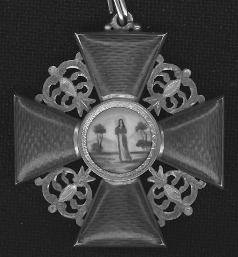
Badge Of The Order of St. Anne, 2nd Degree.
-
- NOVOROSSIYA
- The Arbiter Of Europe’s Destiny.
- The House Dolgorukuy
- Madame Krüdener
- Ekaterinoslav
- The Arabat Arrow
- The Mystery Of General Inzov
- The Doukhobors
- Pushkin
- Chuguev Military Settlement
- “The Blessed”
- The Decembrists
- Penza
- Independence
- Last Words Of Samuel Khristianovich Kontenius
- “Amid Coffins And Desolation”
- Rusalka
- Dead Souls
- Secret Passages
- Astrakhan
- Nevsky Prospekt
- Kalmyk Ulus
- Love And Ambition
- Duellistes
- Pyatigorsk
- A Heroine Of Our Time
- Winter Palace
- Zeneida R-Va
- Steppes
- Letter To Natalya
- Fire And Ice
SOURCES:
[1] Nekrasova, E. S. “Helena Andreyevna Hahn (1814-1842): Part I.” Russkaia Starina. Vol. LI, No. 8 (August 1886): 335-354; Nekrasova, E. S. “Helena Andreyevna Hahn (1814-1842): Part II.” Russkaia Starina. Vol. LI, No. 9 (September 1886): 553-574; Zhelikhovskaya, Vera Petrovna. “Helena Andreyevna Hahn (1835-1842.)” Russkaia Starina. Vol. LII, No. 3 (March 1887): 733-766.
[2] Sinnett, Alfred Percy. The Letters Of H. P. Blavatsky To A. P. Sinnett And Other Miscellaneous Letters. T. Fisher Unwin Ltd. London, England. (1925): 15-18.
[3] Fadeyev, Andrei Mikhailovich. Vospominaniia: 1790-1867. Vysochaishe Utverzhd. Yuzhno-Russkago. Odessa, Ukraine. [Russian Empire.] (1897): Part I: 92-97.
[4] [“Letter From E. A. Hahn To Natalya P. Dated January 10, 1839. [Kamenskoye Village, Ekaterinoslav Province.]” [Preparation of the text and comments by A.D. Tyurikov. Bahmut Roerich Center. Originally published in: Gershenzon, M.O. “Russian Woman Of The ‘30s.” Russian Thought. Vol. XII, C. 55 (December 1911.)]


